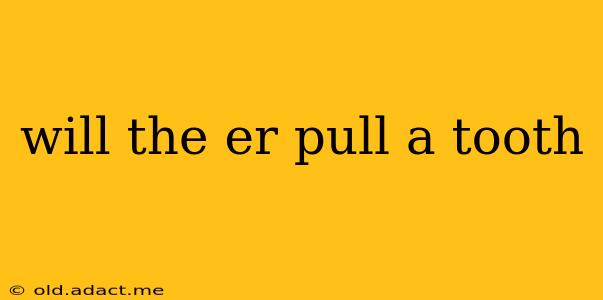Will the ER Pull a Tooth? Navigating Emergency Dental Care
Experiencing a severe toothache or dental trauma can be incredibly painful and stressful. Many people wonder if the emergency room (ER) is the right place to seek help for a tooth problem. The short answer is: sometimes, but not always. The ER's role in dental emergencies is nuanced, and understanding when to go and what to expect is crucial.
What situations warrant an ER visit for a tooth problem?
While the ER isn't a substitute for a dentist, it's the appropriate place to go in certain urgent situations. These include:
- Severe Trauma: If you've suffered a significant injury to your mouth, such as a knocked-out tooth, a severely fractured tooth, or a deep laceration, immediate medical attention is necessary. The ER can address bleeding, stabilize the injury, and potentially save the tooth.
- Severe Pain with Infection Signs: Intense, throbbing pain accompanied by swelling, fever, or pus indicates a serious infection that needs immediate medical attention. The ER can provide pain relief and antibiotics while referring you to a dentist for further treatment.
- Abscess with Difficulty Breathing or Swallowing: A dental abscess is a serious infection that can spread, potentially affecting your airway. If you're experiencing difficulty breathing or swallowing due to a dental abscess, go to the ER immediately. This is a life-threatening situation.
What situations are not appropriate for an ER visit for dental issues?
Many dental problems, while painful, don't require immediate ER intervention. These include:
- Routine Checkups and Cleanings: These should always be scheduled with your regular dentist.
- Minor Toothaches: A mild toothache might be treatable with over-the-counter pain relievers and a visit to your dentist during regular office hours.
- Loose Fillings or Crowns: While inconvenient, these generally don't constitute an emergency requiring an ER visit.
What to expect if you go to the ER for a dental emergency:
The ER will prioritize life-threatening situations first. If your dental issue isn't immediately life-threatening, you may experience a longer wait time. The ER staff will assess your condition and provide pain relief and necessary treatment for immediate stabilization. They may offer antibiotics for infection, attempt to reposition a dislodged tooth, or manage severe bleeding. However, they are unlikely to perform extensive dental work, such as root canals or extractions, unless it is absolutely necessary to prevent further complications.
Frequently Asked Questions (FAQs):
H2: Will the ER pull my tooth?
The ER might extract a tooth only in situations where it's absolutely necessary to prevent further harm, like a severely damaged or infected tooth posing a direct threat to your health. They are not equipped to perform routine extractions. Expect a referral to a dentist for follow-up care, regardless of whether an extraction occurs in the ER.
H2: How much will an ER visit for a toothache cost?
The cost of an ER visit for a dental issue can be significantly higher than a visit to a dentist. Your expenses will depend on your insurance coverage, the services provided, and the specific ER. Expect to incur substantial charges for the examination, treatment, and any medications.
H2: Can I go to an urgent care clinic for a tooth problem?
Urgent care clinics are a better option than the ER for some non-life-threatening dental problems. However, they also lack the extensive dental equipment and expertise of a dentist’s office. Always call ahead to ensure they have the capacity to handle your specific situation.
H2: What should I do if I knock out a tooth?
Immediate action is critical. Try to carefully retrieve the tooth (handle it by the crown, not the root), rinse it gently with milk or saliva (not water!), and immediately go to the ER or a dentist's office. Time is of the essence in saving a knocked-out tooth.
In conclusion: The ER should be your last resort for dental emergencies unless you're facing a life-threatening situation. For most dental issues, scheduling an appointment with your dentist or visiting an urgent care facility is a more appropriate and cost-effective approach. However, don't hesitate to seek immediate medical attention in cases of severe trauma, uncontrolled infection, or difficulty breathing or swallowing. Remember, swift action is crucial when it comes to serious dental problems.
